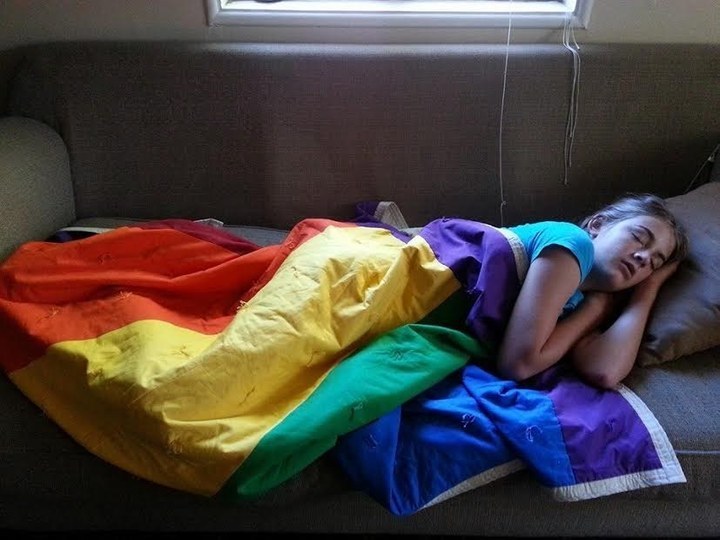This is what young LGBT kids and their parents have learned.
Kate Reese naps under an LGBT pride flag. Emily Reese
Kate Reese, a 13-year-old living in Reno, Nevada, used to think there was something wrong with her.
“I began realizing I wasn’t necessarily straight when I was around 5 or 6,” Reese said. “I saw girls holding hands and thought, I could go for that. Girls were just more interesting.”
Reese may have gone quite a few more years thinking that the innocent schoolyard crushes she harbored were indications of her deviance. But she was able to seek the language to describe herself, and assuage her worries, in a way older LGBT people never could — she had the internet.
“Now I understand what ‘queer’ means, because all of the information is online,” said Reese, who privately started identifying herself as queer sometime in the fourth grade. “Now I understand LGBT terms, and that it’s not a choice. I thought something was wrong with me until I saw all this research. Now I know people like me are out there.”
Kids like Kate Reese have been coming out as LGBT at increasingly younger ages. While studies in the 1970s documented LGBT people coming out, on average, in their early twenties, the latest research demonstrates that the average age has dropped to anywhere between 14 and 16. Caitlin Ryan, a Ph.D. at San Francisco State University’s Family Acceptance Project who has been researching LGBT adolescents for over 25 years, began extensive outreach and in-depth interviews with queer youth in the early 2000’s. “We found the average age of coming out was a little over 13,” she told BuzzFeed News. “And it’s dropping down even more.”
Dannielle Owens-Reid and Kristin Russo, co-founders of Everyone Is Gay and co-authors of This Is a Book for Parents of Gay Kids, attribute lower coming-out ages to the power of representation. “The media is starting to celebrate different kinds of families and identities that didn’t use to be celebrated at all,” Owens-Reid said. She cited television contemporary shows with queer characters like Orange Is the New Black, One Big Happy, and Orphan Black. “People are coming out younger because they’re seeing themselves, finally, in mass media.”
“People are coming out younger because they’re seeing themselves, finally, in mass media.”
As public favor for LGBT rights steadily grows, the number of resources for those who are queer or questioning undergoes tangential upswings.
“The information age has removed [a] barrier that prevented earlier generations of LGBT adults from figuring out who they were,” Ryan said.
On one hand, LGBT people coming out at increasingly younger ages is a testament to American culture becoming less hostile toward queer people. The forces that kept many older generations confined to the closet until college and beyond — fear of intolerance, self-loathing over unidentifiable feelings of otherness, living without exposure or access to other LGBT people — are steadily losing their power. The next generation is growing up with gay characters on their televisions, on their playlists, and queer micro-communities on their Tumblr feeds.
But the change also means that there is a new generation of families scrambling to raise LGBT kids who have specific needs and challenges — kids who are growing up in a society that, while increasingly LGBT-tolerant, is still plagued by hate crimes, job discrimination, and the more banal, everyday sort of homophobia borne by casual ignorance.
“Every week, all over country, parents calls me,” Ryan said. “They say, ‘My daughter is 7, 8, 9 [and they’ve just come out]. Where do we go for help?’”
She added, “There are very few places where families can go to understand what’s happening to their children.”
BuzzFeed News spoke with families and LGBT youth advocates about the brave new world of identifying as queer before puberty — what identification looks like for these kids, and what it asks of the people who raise them.

“Being gay was something I never really questioned,” said Chloe Charbonneau, a 12-year-old from Stockbridge, Massachusetts. “In preschool, I had a crush on a girl. I might have had one crush on a boy in elementary school. But I always did like girls.”
Like Kate Reese, Chloe spent early childhood scared and confused about crushing on girls, especially after being called an anti-gay slur for the first time in the fourth grade. “From then on, I pretended to like boys, because I thought that [gay] was a wrong thing to be.”
Chloe stopped pretending this year. They first identified as gay, then, a few months later, also began identifying as genderless (as a result, Chloe now prefers “they” and “them” pronouns). They recently came out to their parents through a letter.
“It caught us by surprise,” said Chloe’s dad, Gregg Charbonneau. “We didn’t know this was brewing inside [Chloe].”
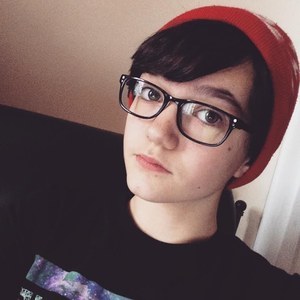
Chloe Charbonneau. Image via Chloe Charbonneau
Amelia, a Midwestern mother of a 10-year-old boy who first began identifying as gay when he was 7, said that her son’s unabashed outness tends to startle many adults who would rather not think about children having sexual desires. (Amelia is a pseudonym; she blogs under that name to protect her young children’s identities.)
Ryan said that many adults don’t readily understand sex and gender identity in adolescents. “When they think of gay people, they think of sexually active people,” she said. “They don’t think of children. But sexual orientation is much broader than sexuality. It deals with connectedness and relatedness. It’s spiritual and social, as well as romantic and sexual.”
“We have feelings and we have experiences at super-young ages, and it’s not always about sex,” said Russo. “It’s about who we have butterflies in our stomachs for.”
Amelia, through her blog and in interactions with the adults in her gay son’s life, tries to battle this stigma. “As a society, if we can open up our idea to what gay means, we can be a lot less uncomfortable with the idea of children identifying,” she said. “It’s about how they think, and what they feel, and who makes them blush — who they want to hold hands with. We all remember feeling like that, from a very young age.”

Because many adults are taken aback at the idea of children who aren’t yet sexually active having sexual orientations, a pervasive misconception plagues LGBT kids: They simply must be too young to know for sure.
“Maybe he’s not really gay,” adults have said to Amelia about her son.
Kate hears it all the time too. “Oh, you just don’t know yet,” she quoted her naysayers.
“Before this current generation of kids, children weren’t raised with gay people,” Amelia said. “They weren’t raised knowing what gay was. Having people in their lives who are married to people of their gender is all a new thing. A lot of gay adults say, ‘I knew I was gay when I was in kindergarten, but I didn’t have the vocabulary to describe what I was.’”
“A lot of gay adults say, ‘I knew I was gay when I was in kindergarten, but I didn’t have the vocabulary to describe what I was.’”
“It isn’t that kids [today] are different people earlier — it’s that they’re understanding who they are earlier,” Russo said. “Instead of the 12-year-old version of me that was like ‘I don’t know why I feel this way about my best friend, I guess I just really want her to be my best friend,’ now [queer kids] have words for that.”
Those words are now just a quick Google search away.
Chloe, like Kate Reese, searched for answers online. “Before this year,” Chloe said, “I identified 100% as a girl, and I never really questioned it very much. Over [last] summer and early this school year, certain feminine things started seeming strange for me. I got very confused for a time. [The pronouns] ‘she’ and ‘her’ started sounding weird, and made me very uncomfortable. When I came across genderless [online], it just clicked.”
Chloe explains more about both their sexual orientation and gender identity in this slam poem they wrote for seventh-grade English class.

When Kate first came out to her mother a couple of years ago, she “didn’t know exactly how to identify [herself].” Now, at 13, Kate still hasn’t settled on an identity — and that comes as no surprise to her mother, Emily Reese.
“She isn’t confused,” Emily said. “Queer makes sense.”
A couple of years ago, when she was 11, Kate cycled through the non-straight possibilities before coming out to her family — was she gay? Was she bi?
She chose, and still stands by, identifying as queer.
“I prefer not to identify as anything specific,” she said. “Queer just means I’m not straight.”
Kate is planning for potential shifts on the spectrum. She knows her parents won’t let her date until she’s 16, so she’s not sure if she’ll end up dating exclusively girls, or if people of other genders might end up in the mix. But she said she’ll be open to possibilities that come with the discoveries of growing up.
“Even if your kid has a different identity in two years, supporting them now is what’s really important.”
Amelia, who has three sons, feels strongly that parents shouldn’t just assume their children are straight until proven otherwise. “Considering how much more fluid the younger generation is about sexuality,” she said, “[Information about and access to queer culture] shouldn’t only be made available to gay identified children — it should be [available] to all children. There are kids and adults coming out of the closet every day.”
When parents come to Owens-Reid and Russo worrying that their child’s professed queerness might only be a phase, this is what Russo tells them: “Even if your kid has a different identity in two years, supporting them now is what’s really important.”

While more LGBT kids are coming out before puberty precisely because the climate of LGBT acceptance grows continually warmer, queer youth still face plenty of obstacles.
“We have so many conversations [with] parents who are super supportive [of their LGBT children], but are really worried about their kid facing discrimination, or problems at school, or just problems in the world at large,” Russo said. “[This is] is a really legitimate concern. When we, as queer people, walk through the world, we’re looked at differently and sometimes treated differently. There are some states where we can be fired from our jobs.”
Kate said that because of the stigma queer kids face, many of them she knows at her school still choose not to live openly. When Kate brings up LGBT issues in classroom discussions, “everyone just goes silent.” Kate’s mother, Emily, drives her to a LGBT youth group in town, since there’s no straight or gay alliance at her school.
Emily is proud of Kate for being vocal about her identity and passionate about LGBT issues. But there isn’t much of a rulebook for raising a queer daughter.
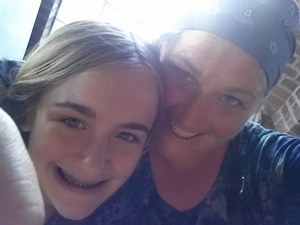
Kate and Emily Reese. Via Emily Reese
Emily has to worry about the parents of Kate’s friends, for example. She told BuzzFeed News some of the questions that run through her mind before playdates: “Do they know [Kate is queer]? Should I tell them? What if their son or daughter isn’t out to their parents?” She also said she wouldn’t allow her straight teenage son to have sleepovers with girls — so what should she do about her queer daughter having sleepovers with girls?
“It’s a bit of a pickle,” Emily said. “But [Kate and I] are open about it, and we talk about it.”
In February, Amelia blogged about the first time her son was met with anti-gay sentiment: A boy in his class told him that being gay was illegal (something that boy picked up from his parents). While newer generations are more gung ho on LGBT rights than any that have come before them, some members of older generations are still prone to espousing more traditional — and less embracing — beliefs.
All young people aren’t saints, either. Many can be cruel. “It’s a little rough in my grade,” Chloe said. “Some kids give me a hard time. Some aren’t homophobic, they’re just new to the idea. Other kids are very open to me and to other [queer kids]. But some really disagree with who I am. They make [their disagreements] obvious, and it does hurt — but it’s manageable. It’s not horrible. “
Kate, who runs an iFunny account dedicated to connecting with and supporting other LGBT kids, said she gets “quite a bit of hate” from trolling commenters. For the most part, the space is a positive one filled with messages of camaraderie with other queer youth, but Kate said she’s received her fair share of nasty comments, including “die, fag.”
Like Chloe, though, Kate says she can endure the hate speech.
“In the comment section,” she explained, “people can write whatever they want. You can’t change them unless you delete them. It sucks… but it’s OK.”
Kate’s and Chloe’s resilience can likely be attributed, at least in part, to the strong support of their loving families. The landscape is decidedly bleaker for LGBT kids who come from what the Family Acceptance Project calls “highly rejecting households.” According to their 2009 study, researchers determined that queer youth from these households are more than eight times more likely to attempt suicide than those in supportive households.
Rejecting behaviors can extend from the seemingly more benign — like refusing to engage a child in discussion about their sexual orientation — to the more severe.
According to Jeff Krehely, the director of the LGBT Research and Communications Project at the Center for American Progress, “We are seeing a new epidemic of LGBT youth homelessness largely because youth are coming out earlier. They are coming out to their families at age 12 or 13 instead of 18 or 20.” In conversation with the United States Interagency Council on Homelessness, Krehely said that “in some ways, this is a good thing — it means they are getting societal cues that it is OK to be gay — but they are not old enough to be able to live independently yet, and they face rejection by parents and families, and emotional and/or physical abuse at school.”
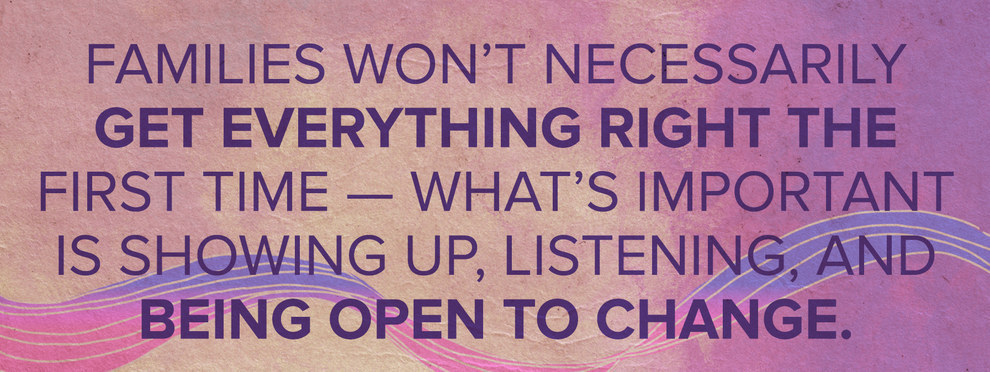
“Families are protective against major health risks [for LGBT youth],” Ryan said of her research. But, she added, they could conversely exacerbate those risks — sometimes inadvertently.
“Many parents have been involved in rejecting behaviors that they thought were actually helping their child,” she said.
“If you’re the parent of an LGBT kid, you need to get on board,” Amelia said. “You are the most important — and sometimes the only — advocate your child has. You need to be very proactive in nurturing and celebrating who your child is.”
“If you’re the parent of an LGBT kid, you need to get on board. You are the most important — and sometimes the only — advocate your child has.”
Some aspects of those celebrations are not always easy. In his interview with BuzzFeed News, Chloe’s father Gregg sometimes slipped into referring to Chloe by “she” and “her” pronouns, instead of “they” and “them.”
“It’s hard, with my own child, to get [the pronouns] embedded in my brain,” he said, correcting himself after a few accidental “she’s.”
“My pronouns are a struggle for [my parents],” Chloe said, “but they are trying — which, to me, is very important. It matters that people get [my pronouns] right, but what matters more is that people put an effort into making me feel comfortable.”
Kate said something similar about her own parents. “My dad doesn’t really understand gender issues,” she said, “but he’s always supportive.” She refers to her mother, her father, and her new stepfather as “sweet and awesome.”
“We need to be prepared to love our kids no matter what,” said Emily. “As soon as we start putting what we want for our kids beyond happiness and safety and health, we are looking for disappointment.”
Kate’s father came out as gay while Kate was still growing up; he and Emily, Kate’s mother, consequently divorced. Emily, who wrote about being the straight spouse of a recently out gay man, credits the experience with her ability to be a better mother to Kate now than she otherwise might have been.
“If Kate had come out to me 10 years ago, I would have reacted much differently,” she said. “I grew up in a fundamental Christian church.” Emily didn’t start questioning some of her previously held beliefs about LGBT people until she discovered she had married one.
“I would hate to alienate or harm my child in any way,” she said. “I can’t imagine doing that to my kid. I used to be one of those people. I’m really grateful I’m not anymore.”
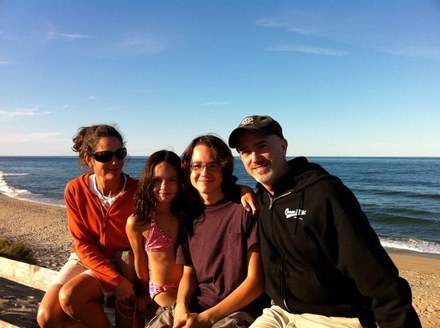
The Charbonneau family: Cherisse, Chloe, Cole, and Gregg. Via Gregg Charbonneau
“If you’re a parent of a young LGBT kid, it’s important to come from a place of openness, instead of a place of fear,” Amelia said. “There are going be those people who send us hate mail and aren’t going to support our child. But there’s also a lot of well-meaning people out there who are just simply trying to understand. We have an opportunity to educate. We can get a lot further if we aren’t all silent and scared, if we’re asking questions, if everything is out in the open. There is no shame — there can’t be.”
“Maybe it seems obvious, but: Listen,” Gregg said. “Just listen to your kids. Don’t ever judge them. Don’t try to explain how they’re feeling because you really don’t know. Don’t assume you know anything. Listen to what they have to say, and just be there for them, and be supportive, and be behind them 100%.”
Gregg added that other parents of LGBT kids shouldn’t be so adamant to hold onto the conventional ideas surrounding gender and sexuality with which they’ve likely grown up. “Having these gender issues happening to my child, who is my life, has really made a lightbulb go off — the whole binary gender system that I grew up under just doesn’t really make sense,” he said. “Fluidity between male and female makes sense. I’ve seen and felt these things throughout my life, and I think we all do, but there haven’t been words for it before. Going through this with my family really drives it home.”

With the World Wide Web at their disposal, many LGBT kids go beyond googling gay search terms — some are also using technology to connect with, and support, queer youth from around the world.
Kate doesn’t have many queer friends at home in Reno, Nevada, but she has plenty on the internet. “It’s very important to me, having LGBT friends online,” Kate said. “My straight friends in life don’t understand issues queer people have to go through.” She added, “I’m not interested in romantic stuff, but it’s nice to have queer friends.” Chloe has also befriended other queer kids online by moderating a popular Instagram devoted to celebrating trans visibility.
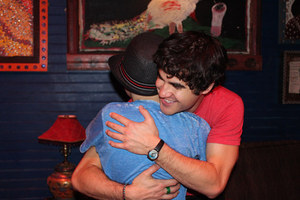
Amelia’s son meeting his “boyfriend,” Darren Criss, who plays Blaine on Glee. Via huffingtonpost.com
The young people BuzzFeed News interviewed are just as active in their own real-life communities. Amelia’s 10-year-old son, for a second-grade project on civil rights leaders, taught his young peers about Harvey Milk, while Kate competed in a National History Day contest with a project on the AIDS activist Cleve Jones. Chloe recently gave a presentation to her middle school’s faculty about how to support LGBT kids in the classroom.
“I presented on why I think it’s important for [LGBT kids] to feel safe and accepted at school, because that’s a place where a lot of us struggle with who we are,” Chloe said. “Everyone in the [LGBT] community should feel safe coming to school — and almost all of us don’t.”
Chloe’s biggest cause is unisex bathrooms. “Bathrooms are places where trans people face a lot of harassment,” she said. “In schools and pretty much in any public building, there should be a unisex bathroom, no matter what.”
Kate, for her causes, wants to see more LGBT teen representation in the media, as well as an increase in visibility for queer people of color. “People make out being gay as a white thing, and it’s awful.” She also thinks the contemporary LGBT movement should be more focused upon transgender rights. “Transgender people are natural,” she said, “non-binary people are natural, and different sexualities are totally natural.”










